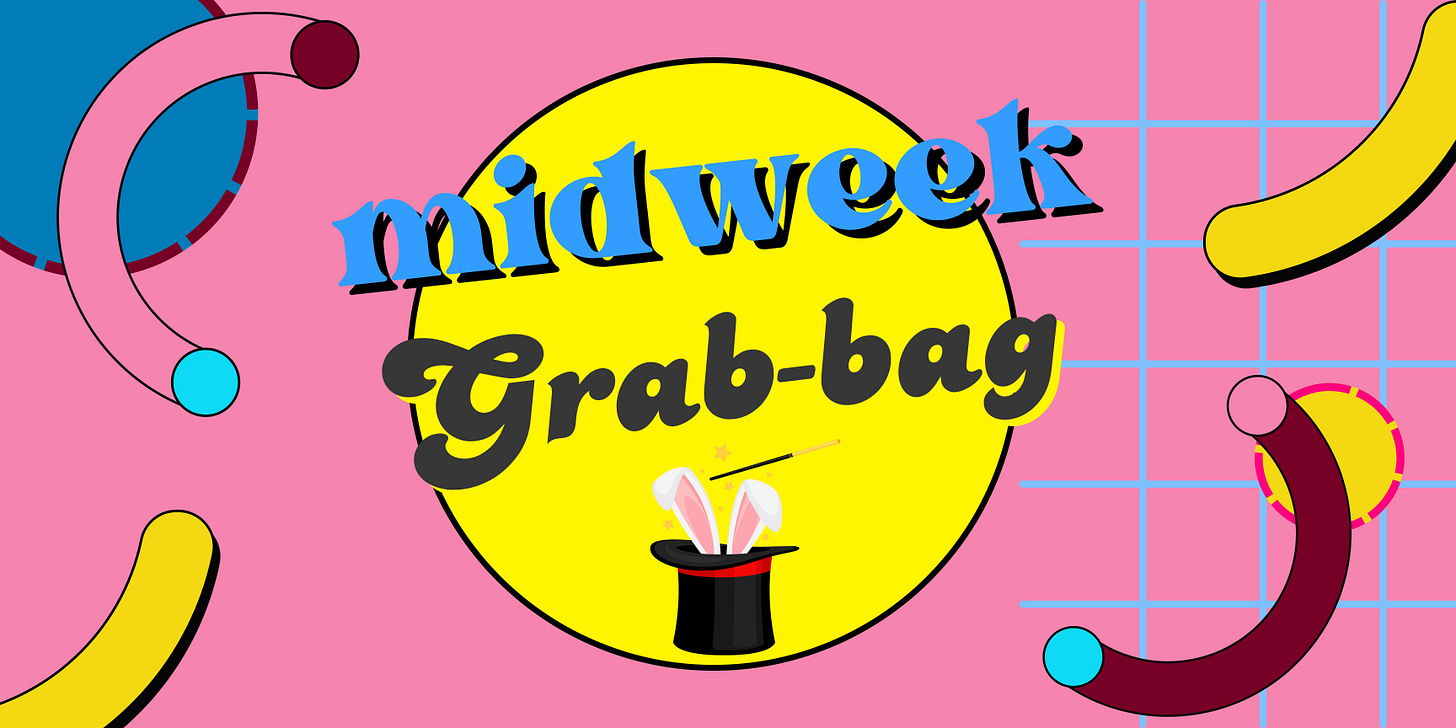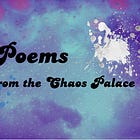Surprise! It's a Torah Throwback
Sometimes the grab-bag gets biblical, what can I say?
Dear fam,
One amazing side-effect of writing this newsletter every week (often multiple times a week) is how it’s made me more aware of the little moments in life. I never want to find myself on Friday with nothing to say, so I’m always trying to take little snapshots with my mind.
*flash* Big Kid riding her bike on the blacktop at school.
*snap* Toddler walking into preschool clutching her kangaroo-fox.
*flash* My wife reaching over from the passenger seat to put her hand on mine.
Each one of these is like a tiny geode, crystalized time glittering inside. I place them carefully with the rest of my collection, and try not to forget their specific shine.
Before I began Welcome to the Chaos Palace, I wrote a parenting blog for a paper based in the Twin Cities of St. Paul and Minneapolis. I’ve never been to Minnesota. Nonetheless, the editor liked my pitch — Parenting by Parashah — a weekly column about parenting as understood by thinking about the weekly Torah portion.
Sort of a proto-Chaos Palace, as it were.
In Jewish practice, the Five Books of Moses (collectively, the Torah) are read each year in their entirety, one bit at a time every week. Each of these bits is called a portion (or parashah) and is paired with a selection from one of the books of prophets, known as a haftarah. Traditionally, the Torah portion is chanted publicly according to specific, very old melodies (that differ in various communities). Each portion has a name, usually taken from the first or second verse of the section.
I wrote 52 of these, each week for a year, and it helped me to read the biblical text through this specific prism. I grew up going to synagogue every week, where I’d heard every portion many times. But this was different. I was different. The words came off the page into a mind changed by the radical experience of becoming someone’s mama.
I’m so grateful to that editor for taking a chance on me. Like so many other generous editors before and after him, he helped me become the writer I am today. And even though I continue to change, and now-me is different than then-me, I’m still proud of the work I did during that time.
When I thought about what to share for this week’s grab-bag, it occured to me that it might be interesting to dig up the Parenting by Parashah post for this week’s Torah portion I’d written back in the day. So, I got in the way back machine [read: my Google Drive] and found it. The experience of reading this now is both bizarre and resonant. I’m not her anymore, but I also am.
There is so much she doesn’t yet know, and that’s kind of lovely. We didn’t even have Toddler yet when this was written! Makes me almost wistful, but also thrilled. Because this Mikhal hadn’t experienced the many, many moments of joy that were yet to come. It’s exhilarating to think about what joy awaits me, and all of us, in days to come.
During these dark days, it feels good to remember that future joy is on the horizon.
I hope you enjoy this blast from my past, and that you hold past me with compassion. That’s how I’m holding her.
See you Friday (which I guess is tomorrow, even though I’m writing this Wednesday evening) for a Chaos Palace update!
With much love,
Mikhal
Parenting by Parashah: Ki Tisa (2022)
Parenting is hard. Of course, it’s also joyful, and awe-inspiring, and wondrous. All of that. But it’s okay to say that it’s hard, too. Anything you do day in and day out, especially anything you’re learning on the job, would be hard. Parenting, though, is a special kind of hard, and that’s because it comes with a veritable trousseau of baggage that you’ve collected over the course of your lifetime. Everything you think you know about yourself, about your strength of character and the way you were raised, will come into question when you have a child.
I know it’s just part of the process, but it can be a very painful part. Your child will be a reflection of some parts of you or your partner (if you’re raising a child with a partner), and that reflection will be sometimes adorable and sometimes terrifying. ‘Oh no, is that what I’m like when I’m angry?’ you’ll wonder, knowing that the answer is absolutely yes. They’ll inherit some traits that you didn’t know you loved about yourself, and some traits you kind of hoped would get lost in the mix.
Some parts of them will be brand new, too, and you’ll have to figure out how to navigate those as well.
I’m thinking about all of this because a verse jumped out at me as I was reading the Torah portion this week. God is giving further instructions on how to craft the Ark of the Covenant and telling Moses who will be tasked with the creation of this sacred object. “See, I have singled out by name Bezalel son of Uri son of Hur, of the tribe of Judah,” says God in Exodus 31:2. Why Bezalel, you wonder? God answers that right away. “I have endowed him with a divine spirit of skill, ability, and knowledge in every kind of craft, to make designs for work in gold, silver, and copper, to cut stones for setting and to carve wood — to work in every kind of craft,” He says in Exodus 31:3–5.
In other words, Bezalel was just born talented. Which is not a revelatory statement. Of course we are each born with our own specific gifts and abilities. As a mom, I would be happy to sit and tell you all about my child’s inherent genius. Yes, I know this is a cliché, and no, I don’t care.
The part that has me thinking is what this means for my role as a parent. I know that some things about my kid just are the way they are. For example, the way she never sits still. This is not an exaggeration. My wife loves to tell the story about how, at our very first ultrasound, when she was just a teeny, tiny blueberry-sized person, the technician couldn’t get a good view because the blueberry kept jumping.
Folks, she is still jumping. [Note from now-me: She is still jumping now, too.] She was born a ball of energy and has remained so. She was also born with a sensitivity to sounds, an affinity for music, and a determination that has led her to master physical skills long before she should have. I, for one, could have lived with her taking first steps a little later than she did, but (like so many things) this was not up to me.
Before I became a mother I thought that my role as a parent would be to teach and guide my little one. The Hebrew word for parent, horéh or horáh, depending on the gender, comes from the same root as the one for teacher—moréh or moráh. It also shares a root with the word Torah, which is sometimes described as a guide for how to live a life of spiritual connection to God and our ancestors.
The thing, though, is that I’m not so sure this is the definition of my role anymore. I mean, of course I teach my child things. My wife and I spend all day explaining how to put Legos together, how to brush teeth, how to ask nicely, and on and on. But part of me thinks that my role is more preservation than it is guidance.
Who my child is right now, this unadulterated version of herself, is so bright and bold it can be blinding. Her emotional self has no inhibitions: When she’s sad, she’s heartbroken; when she’s angry, she’s furious; when she’s happy, she’s overjoyed. She speaks her truth. If she doesn’t like something (or someone), you’ll know about it. When she loves a song or a story, she wants to submerge herself in it. In truth, I’m learning a lot from her about how to be authentic and vulnerable.
So much of what we do as we get older is about hiding ourselves in order to be acceptable by societal norms. We don’t want to be too much, or not enough, or weird. We don’t want to have too many big feelings, or to say the wrong thing. We fear rejection. Is my job, as a parent, to protect my child from the rejection of society by teaching her to rein it in? Or is it my job to do the opposite, despite the ensuing heartbreak at the hands of those she will undoubtedly encounter?
I do believe that God gives us innate abilities, that much of who we grow up to be has to do with who we’ve always been. It’s clear to me that my wife and I will encourage her to pursue her various interests (music, cars, magna-tiles) and I know we want to help her figure out how to keep her ability to be in her feelings, and to be honest about what she’s thinking and feeling. This will be hard, but it’s worth it. Maybe that’s a truer meaning of parenthood, not teaching a blank slate about the world but recognizing that our children are rich beings and nurturing those parts of who they are. Instead of adhering to societal expectations, maybe the more radical thing to do, as parents, is to forge a new, more authentic society full of people who are connected to their most honest selves.
Did you know? Welcome to the Chaos Palace is a space uplifting ADHD, queerness, Judaism, and how to navigate the mess that is the world. You can support my work by sharing this post with others, getting a paid subscription, or just clicking the like button. That makes the algorithm send my words to other folks who might enjoy ‘em. Or just read! That’s huge, too, and very appreciated! Thank you!











